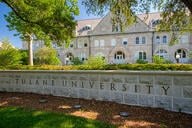You have /5 articles left.
Sign up for a free account or log in.
Should academic libraries purchase popular nonfiction?
Should academic libraries supply borrowers with the book format that matches their preferences and learning styles (paper, e-paper, or audio)?
Where does meeting staff needs for both collections and formats fall into the purchasing priority for academic libraries?
These questions are all motivated purely by self-interest. Popular nonfiction books are usually the most important titles in shaping my thinking and developing the knowledge necessary to be effective in my work. Audiobooks are the only platform that allows me to keep up with my reading, as I can read while multitasking (mostly running, driving, and doing the dishes).
I was interested to see what the overlap is in my library's collections with the audiobooks that I purchased from Audible. I made a spreadsheet listing all my audiobooks, and then went to my library catalog to see if we had the paper book. You can see the spreadsheet at this link. To my delight, I found that of the 197 books on my list the library owns paper copies for 146 (74%). It does appear that academic libraries (at least my library) are purchasing the sort of nonfiction that is relevant to my interests and work in learning technology.
On the second question, should academic libraries be "format neutral" and provide the book format (paper, e-paper, audio) that borrowers want? Well, I realize that this is more complicated question. I'm learning more each day from my librarian colleagues on the various constraints they face. (See the great discussion on E-Library Economics). The main audiobook / e-book providers (like Amazon and Apple) do not offer library subscription models. What subscription models do exist are prohibitively expensive, and often contain overly restrictive DRM. What I'd like to understand is if format neutrality is a goal? And where does this goal rank in their list of priorities? Do academic librarians see the inability to offer books in the multiple formats as a major shortcoming, or do the advantages of paper outweigh any desire to provide audio and e-paper versions?
Which brings me to my third question about the different academic library constituents. As a learning technologist I rely on all sorts of theories, facts, and arguments from a range of disciplines. Working in learning technology involves managing change, understanding organizational dynamics, and developing expertise in how people learn. These tasks are multidisciplinary, and my nonfiction reading reflects my needs. What I wonder is, where does staff fall into the hierarchy of constituents that the academic library seeks to serve? Will demand from students and faculty drive a change to e-books and audiobooks, or is this an area that staff can have an impact? Does the argument that the need for multiple book formats to serve multiple needs and learning styles have any traction?
Looking forward to the discussion.




